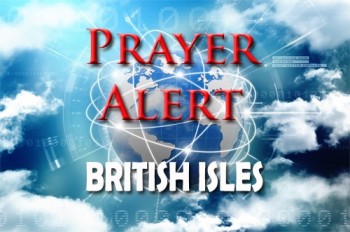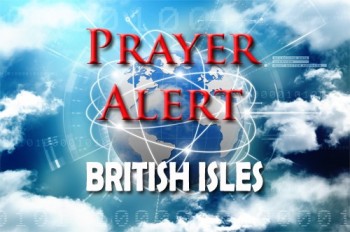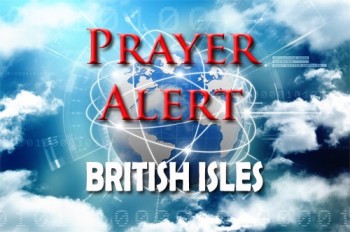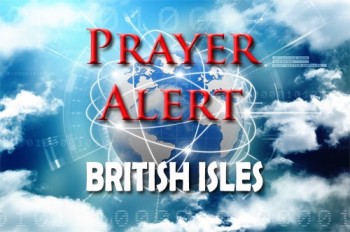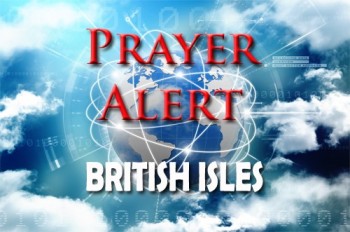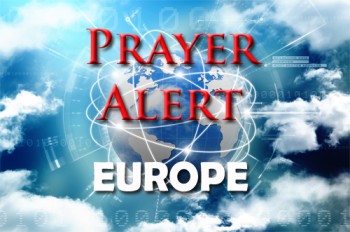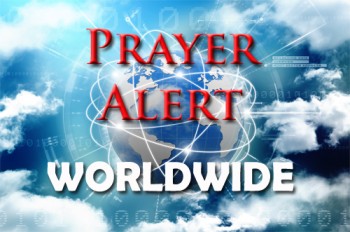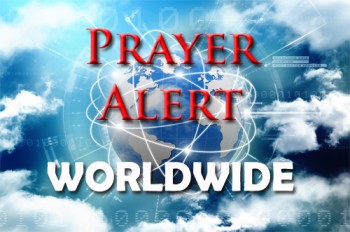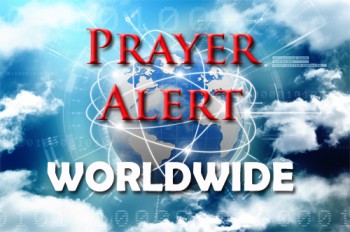
David Fletcher
David Fletcher is Prayer Alert’s Editor.
He is part of a voluntary team who research, proof-read and publish Prayer Alert each week.
If you would like to make a donation towards our running costs, please click here.
There have been calls for protection for churches in Northern Ireland after 445 incidences of criminal damage to religious buildings, churchyards, or cemeteries in the last three years. Belfast’s synagogue and Islamic centre have also been damaged in the last ten years. The leaders of all the political parties have been urged to make more support available to religious buildings and to commit to setting up an initiative like the ‘Place Of Worship Fund’, which helps to protect religious buildings in England and Wales. Ulster Unionist MLA Robbie Butler said, ‘Places of worship, no matter what faith or denomination, should be a cherished place of peace and sanctuary. Attacking a church is an attack against its entire congregation.’
Two teenage asylum-seekers have won their battle to escape deportation to Pakistan. Brothers Somer Bakhsh and Areeb have spent most of their lives fearing that they could be forced to leave Glasgow and sent back to the country of their birth where Christians are persecuted. They now have some certainty in their lives, but they have only been granted ‘limited leave to remain’ until February 2022. Somer, who got four As and a B in his Highers and aspires to be an astrophysicist, said, ‘Scotland is my home. I have grown up here, all my friends are here, and I feel like a Scottish boy.’ First minister Nicola Sturgeon described the brothers as a ‘credit’ to Scotland, and Jeremy Corbyn urged the Home Office to grant the family leave to remain.
More than 210,000 children are estimated to be homeless. The Children's Commissioner for England says that, as well as the 124,000 children officially classed as homeless, a further 90,000 are estimated to be ‘sofa-surfing’. Her report tells of families housed in repurposed shipping containers and office blocks, and whole families living in tiny spaces. Councils blamed a £159m funding gap. The report, entitled Bleak Houses, found office-block conversions in Harlow in which over 1,000 whole families live in single rooms barely bigger than a parking space, and shipping containers which are blisteringly hot in summer and freezing in the winter months being used in Bristol, Cardiff and London. The report warns that a further 375,000 children in England are in households that have fallen behind on rent or mortgage payments. This means that thousands more are at financial risk of becoming homeless in the future.
1) The fatal accident rate on farms is higher than any other sector. 2) Theft from British farmers hit a seven-year high of £50m in 2018, with a 26% rise in stolen farm vehicles and a 3.7% rise in animal theft. 3) As a result of the crimes, farmers are reporting increased levels of anxiety and isolation. 4) Farmers fear they could go out of business following the post-Brexit trade deal with the USA that is being publicised as a way to boost the UK economy. They need reassurance that their high standards will not drop to compete with US chlorinated chicken, gamma radiation to eliminate microorganisms, and genetically modified crops. 5) Suicide rates in farming are reported to be among the highest of any occupational group, with more than one farmer a week in the UK taking their own life. See also
Jennie Powell was 22 weeks pregnant when she went into labour while on holiday. She was taken to a specialist neonatal unit 190 miles away. Despite being given tiny chances of survival, Ruben and Jenson Powell were born, and cared for extensively, and are alive today - a wonderful example of protecting the most vulnerable in our society. The inspiring story demonstrates the humanity of very young children - before they even have meaningful protection in law - at least within England and Wales. Last year, thousands of children were aborted after 20 weeks of pregnancy in England and Wales alone. Nearly 1 in 4 pregnancies ended in abortion (excluding miscarriages and stillbirths). All these children didn't get a chance. Pro-life advocacy has fought against the culture of abortion for over 50 years in the UK, and now the culture of death could spread to Northern Ireland.
The 2019 G7 summit in Biarritz will focus on fighting inequality. The following five objectives will be discussed, and we can pray that they will be acted on: a) inequality of opportunity, promoting in particular gender equality, access to education, and high quality health services; b) reducing environmental inequality by protecting our planet through climate finance and a fair ecological transition, preserving biodiversity and the oceans; c) strengthening social dimensions of globalisation through more equitable trade, tax and development policies; d) action for peace against security threats and terrorism; e) tapping into the opportunities created by digital technology and artificial intelligence. Pray for all those participating in the summit: may God rule and reign in every discussion and decision made. See also the article on African wildlife and timber in the world section.
Amid growing alarm over accelerating extinctions, a major two-week international conference opened in Geneva on 17 August. 183 member states aim to tighten rules on trade in elephant ivory and other endangered animal and plant species. One million species are now at risk of extinction due to human activities. One of the 56 proposals on the agenda aims to prevent traffickers from passing off illegal elephant ivory as coming from mammoths, by listing the long-extinct mammals as a threatened species and thus subject to regulated trade. White rhinos, the American crocodile, and a range of shark and ray species are also on the agenda, as is the giraffe. The future of biodiversity is at stake, and we have a unique opportunity to change its course. WWF reported that Earth’s animal population has plummeted 60% in 44 years.
A third of the world call themselves ‘Christians’, but many are missing from our churches; others are present, but don’t have the joy of knowing and following Christ. Something has to change! Mission to nominal Christians is missing from the global church agenda. We need to confess and pray: ‘Father, we confess that we have overlooked nominal Christians in society and in our churches. We confess faltering witness, defective discipleship, and lack of concern for those who bear the name of Christ but through ignorance, sin, or rejection are far from the way of Christ and his church. We are quick to judge and slow to listen - especially when they come from a different church tradition. We ask you, Father, to touch the lives of nominal Christians with your powerful Holy Spirit so that they will come to a saving faith in Christ.’
Pastor Cruz Canseco was in the pulpit of his church when he was shot at point-blank range. His attacker was prevented from escaping, and was subsequently handed over to the authorities. The pastor died on the way to hospital. His murder follows a series of attacks targeting religious leaders, including the kidnapping of Pastor Méndez Ruiz, who had prevented Cuban migrants from being abducted from a shelter on 3 August. The expansion of violent criminal groups and the pervading climate of impunity surrounding such crimes has led to increased violence against religious leaders. Criminals view church leaders as a threat to their power, so they are threatened, kidnapped and killed. Lack of proper investigation means perpetrators are not brought to justice. Pray for the family and congregation of Pastor Cruz Canseco and for the wellbeing and return of Pastor Ruiz .
Violence is an everyday threat to the poor. It is as much a part of daily life as hunger, homelessness or disease. Established laws are rarely enforced in the developing world - so criminals continue to rape, enslave, traffick, and abuse the poor without fear. Children and young women are forced into the sex industry, generating billions for those who exploit them. Millions of children and families are held as slaves in abusive and often violent conditions. Globally, 1 in 5 women is a victim of rape or attempted rape, and the poor are most vulnerable. Vulnerable widows and orphans are chased from their homes, leaving them destitute. Corrupt police officers extort bribes from the poor and throw the innocent in jail. Minority families are denied legal rights, leaving them open to trafficking and abuse. Pray for justice in all these situations.

